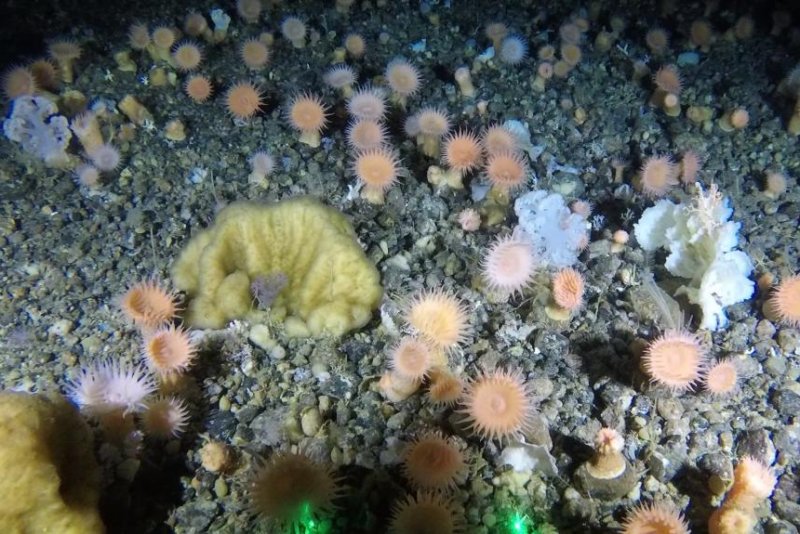Soft coral garden found in Greenland's deep sea
WELL THAT WAS UNEXPECTED

Researchers found an abundance of sea anemones in the deep sea coral garden off the western coast of Greenland. Photo by ZSL/GINR
June 29 (UPI) -- Scientists have discovered a soft coral garden off the coast of western Greenland, some 1,600 feet below the ocean surface.
The ecosystem -- described Monday in the journal Frontiers in Marine Biology -- was discovered using a novel, low-cost underwater video system developed by researchers at University College London, the Zoological Society of London and the Greenland Institute of Natural Resources.he discovery could have implications for the management of nearby deep-sea trawl fisheries.
"The deep sea is often over-looked in terms of exploration. In fact we have better maps of the surface of Mars, than we do of the deep sea," Stephen Long, first author on the new study, said in a news release.
RELATED Deep reefs could offer refuge to vulnerable marine life as oceans warm
"The development of a low-cost tool that can withstand deep-sea environments opens up new possibilities for our understanding and management of marine ecosystems," said Long, a postdoctoral researcher in the geography department at UCL. "We'll be working with the Greenland government and fishing industry to ensure this fragile, complex and beautiful habitat is protected."
The soft coral garden features an abundance of cauliflower corals, as well as feather stars, sponges, anemones, brittle stars and hydrozoans bryozoans.
"Coral gardens are characterized by collections of one or more species -- typically of non-reef forming coral -- that sit on a wide range of hard and soft bottom habitats, from rock to sand, and support a diversity of fauna," said Chris Yesson, study co-author and ZSL researcher. "There is considerable diversity among coral garden communities, which have previously been observed in areas such as northwest and southeast Iceland."
RELATED Global warming is undoing decades of progress in marine reserves
In addition to being pitch black, deep sea environments host extreme ocean pressures. The pressure at 500 meters, or 1,600 feet, underwater is 50 times greater than at sea-level.
Most deep sea observations require expensive remote-controlled submersibles, but for the latest survey, researchers developed a low-cost alternative using a GoPro video camera, outfitted with lights and lasers, and housed in a pressure-proof container. Scientists situated the protected camera system in a large steel frame and lowered it into the ocean off the coast of Greenland.
The researcher team deposited their video sled on the ocean bottom and started recording. Scientists captured 15 minutes at a time across 18 different locations.
RELATED Study shows changes in Great Barrier Reef fish during heat wave
"A towed video sled is not unique. However, our research is certainly the first example of a low-cost DIY video sled led being used to explore deep-sea habitats in Greenland's 2.2 million square kilometers of sea," Long said. "So far, the team has managed to reach an impressive depth of 1,500 meters. It has worked remarkably well and led to interest from researchers in other parts of the world."
The deep sea is one the planet's least understood environs, but researchers hope their new video sled will make deep sea research more accessible to scientists across the globe.
"Greenland's seafloor is virtually unexplored, although we know is it inhabited by more than 2000 different species together contributing to complex and diverse habitats, and to the functioning of the marine ecosystem," said Martin Blicher, researcher at the Greenland Institute of Natural Resources.
RELATED Plastic found in amphipods in Earth's deepest ocean trench
"Despite knowing so little about these seafloor habitats, the Greenlandic economy depends on a small number of fisheries which trawl the seabed. We hope that studies like this will increase our understanding of ecological relationships, and contribute to sustainable fisheries management," Blicher said.
upi.com/7018078
No comments:
Post a Comment